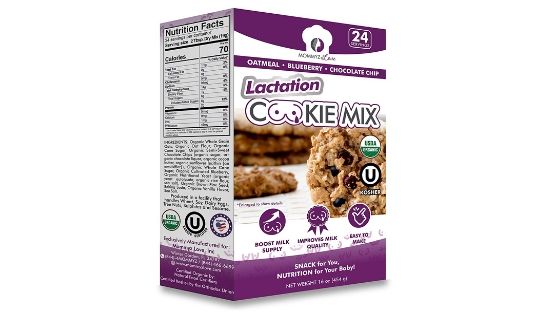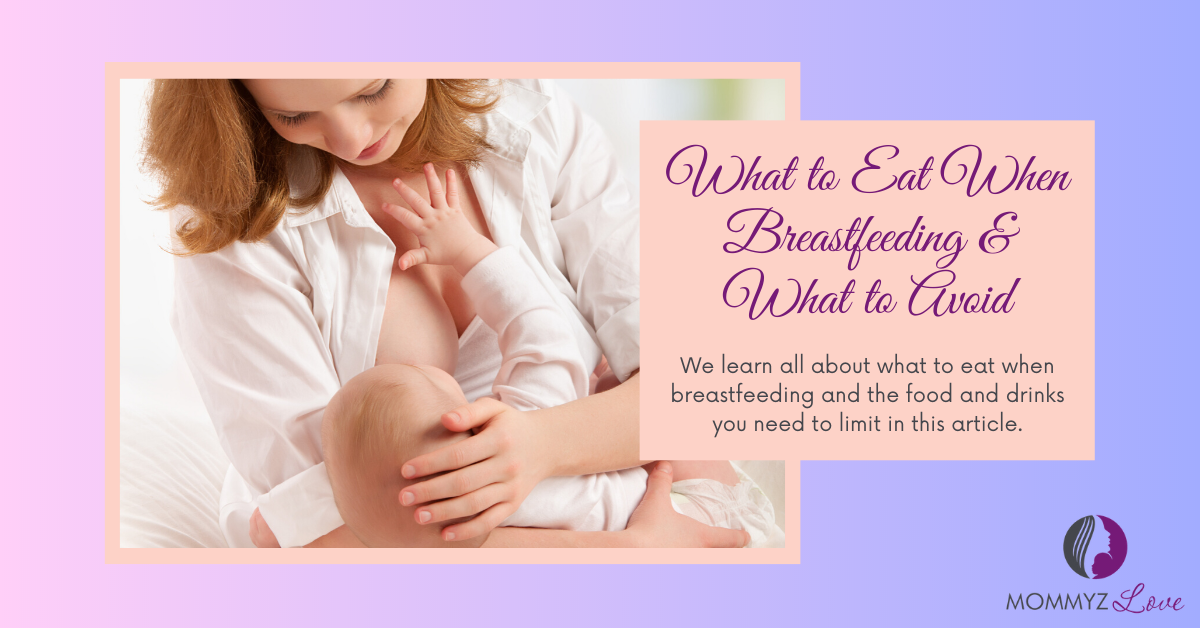When it comes to feeding your little one, we all know that breast milk is simply the best! But what should you eat when breastfeeding your little one? Are there significant changes and adjustments that you need to take now that nursing? We learn all about what to eat when breastfeeding and the food and drinks you need to limit in this article!
In A Nutshell…
- On average, breastfeeding moms need about 450-500 more calories in a day. This can be dependent on the mother’s age, activity level, BMI, and extent of breastfeeding.
- Your diet as a breastfeeding mother only has little influence on the quality and quantity of your breast milk. Regardless, it’s still good to focus on having a good diet to keep you healthy and fueled for breastfeeding
- Eat a nutritionally balanced diet that includes a good amount of fruits and vegetables, whole grains, lean proteins and fish, dairy, and galactagogues. It’s also essential to drink ample glasses of water to stay hydrated.
- A breastfeeding diet has no restrictions. Just limit your consumption of seafood, alcohol, caffeine, and sugary drinks.
What’s In Your Breastfeeding Diet

Eating for two just doesn’t quite end right after pregnancy. In fact, now that you’re breastfeeding, it’s good to think twice about the foods and drinks that you consume and how they may or may not affect your breast milk supply. But here’s the good news: your breastfeeding diet isn’t as restrictive as it used to be when you were pregnant. Yup, that means caffeine, alcohol, and sushi can now be enjoyed as you breastfeed your baby!
Nutritional Requirements for Breastfeeding Women
Energy and Calories
One thing’s for sure, breastfeeding mothers generally have to increase their caloric intake to meet their energy needs. According to health experts, breastfeeding can burn about 650 calories per day (a 200-calorie increase compared to when you were just pregnant).
To supplement this, you need to be eating 450-500 more calories per day on average, depending on your age, BMI, activity level, and extent of breastfeeding. My Plate Calculator will help you figure out how much calories you’d be needing in a day.
Nutrients
Specific macro- and micronutrient needs as a breastfeeding women aren’t all too different from when you were pregnant. It’s important that you are meeting these nutrient requirements to strengthen your body and power you through breastfeeding. Here’s a list of the recommended servings of certain nutrients:
- Protein: 3 servings
- Whole Grains and Complex Carbohydrates: 3 or more servings
- Fat: Small amounts
- Calcium: 5 servings
- Iron-rich foods: 1+ servings
- Vitamin C: 2 servings
- Vegetables/fruits: 3 – 5 servings
- Omega 3 Fatty Acids: 2 to 3 servings per week, to promote the baby’s brain development
How A Mother’s Diet Affects Breast Milk Composition and Supply?
Many mothers are extremely observant about what they eat and drink in fear that whatever they take in might make it to the breast milk. However, this is a common misconception. Indeed, there is no such thing as a perfect diet for the perfect quality and quantity of breast milk. In fact, your diet may only have a little influence on your breast milk composition and supply.
So where does your breast milk pull all of its nutrients from? The calories, fats, proteins, vitamins, and minerals found in breast milk is sourced from the mother’s internal organs (blood, bone, and fat). Truth is, having a poor diet might likely affect you more than your breastfed baby.
If that’s the case, is there still a need to eat healthily? Of course! When you consume a balanced diet that’s eaten in moderation and with variety, you’re not only supplying your body with all the necessary nutrients but also fueling your body for breastfeeding.
With regards to your nutrition and diet, these are a few things you may need to consider:
- Making sure you get enough calories. A good rule of thumb is just by eating intuitively in the first few months after giving birth. Counting your calories can throw you unnecessary stresses, so it’s best to be sensible with your diet.
- Drinking water and staying hydrated. Think drinking a lot of water can also increase your milk supply? This is NOT entirely true. However, it’s still essential to keep yourself hydrated to avoid dehydration, constipation, and other discomforts.
What To Eat When Breastfeeding

Having a special diet is not all too necessary when breastfeeding. It’s just good to keep in mind that what you eat should be nutritionally balanced. That means consuming a lot of vegetables and fruits, switching refine carbs with whole grains, and choosing lean proteins and healthy fats!
Fruits and Vegetables
Load up on all the salads, fresh fruits, and roasted veggies! Vegetables and fruits are the best sources of vitamins and minerals which help keep you in tip-top shape. These include the B-vitamins, folate, potassium, vitamin A, C, and E!
Another good thing about fruits and vegetables is their fiber content. Fiber acts like a sweeper inside your intestine, cleaning and ridding it of all the toxins in your digestive tract. With good amounts of fiber, you’d also be feeling fuller for much longer!
Whole Grains
Get your source of energy from complex carbohydrates like whole grains! You can choose from brown rice, quinoa, whole wheat bread and pasta, oats, or barley. They are great for you because they are much denser in terms of their carbohydrates and calories compared to fruits and vegetables.
Since they are more calorific, remember to keep your eye out on your portions. According to the MyPlate, 3 servings of whole grains should be enough in a day. Make your carb-sources more exciting by incorporating them into your favorite desserts! For example, there are special kosher lactation cookies that use galactagogues (read more about it below) and variations of different oats and grains to help boost your milk supply.
Lean Proteins and Fish
Lean animal proteins contain all the nine essential amino acids that your body needs. These amino acids become the building blocks that strengthen and improve your muscle and organ functions.
Find protein sources that are low in fat like chicken, turkey, fish, eggs, milk, or yogurt. In a healthy breastfeeding diet, achieve at least three servings (1 serving every meal) of protein daily.
Dairy
Did you know that your body loses its calcium reserves to support your baby’s growth and development from pregnancy to breastfeeding? That’s why it’s important to restore calcium through your diet. This nutrient is special as it supports your skeletal function, keeping both your bones and teeth strong. Calcium also plays a role in muscle contraction, nerve function, blood clotting, and cell communication.
In a day, it’s recommended to consume about 1000-1500 mg of calcium per day. Dairy is one of the best sources of this mineral. Try having more milk, yogurt, green leafy vegetables, or broccoli in your diet.
Water
Hydration is key — especially when your breastfeeding. Contrary to popular belief that drinking lots of water increases your milk supply, it’s still vital to prevent your body from becoming dehydrated. This can lead to a myriad of other health and digestive problems like constipation, fatigue, and urinary tract infections — as well as the lack of energy to breastfeed well.
According to experts, breastfeeding women are recommended to drink about 8-10 glasses of water every day. Aim to chug down a glass of water in between and during your meals.
Special Foods To Consider In Your Breastfeeding Diet

Lactation Foods (Galactagogues)
There are certain foods in the market that are being looked into as substances that may help improve a mother’s milk supply. These are called galactagogues, which usually come from herbs like fenugreek, alfalfa, goat’s rue or blessed thistles and other foods.
On average, most mothers do not need the aid of galactagogues to maintain or increase their supply. However, you might be in situations wherein you want to consider using lactation foods to support your breastfeeding:
- If you are working, foods with galactagogues can help increase your pumping output.
- If you have low milk supply, eating lactation foods while frequently breastfeeding or pumping can boost your milking power.

For only $14.97, you can get 24 servings of cookies with our Kosher Lactation Cookies Mix which many of our mommy fans are raving about on Amazon. Read more about our lactation cookie mix’s all organic ingredients and how to prepare it.
Multivitamins
If you’re eating enough and well, multivitamins aren’t necessary to include in your daily diet. However, if you are on a special diet (e.g. vegetarian diet), you may be at risk of certain nutrient losses which might require you to supplement through vitamins.
If you still choose to take in multivitamins, be aware of the following:
- Most mineral supplements like calcium, iron, zinc, and copper don’t affect your breast milk supply or composition.
- Water-soluble vitamins (B-vitamins and vitamin C) can influence breast milk levels. However, they only increase up to a certain point and remain steady afterward.
- Fat-soluble vitamins (A, D, E, K) can become concentrated in breast milk, so excesses might become harmful for your baby.
- Consult your doctor if you want to take multivitamins and other nutritional supplements to know if it’s safe for you and your baby.
What Foods To Limit When Breastfeeding

Time to celebrate, mommyz! Most foods are allowed now that you are breastfeeding. However, there are still a few that you may need to eat or drink with caution. Substances in high-mercury seafood, alcohol, and caffeine can creep up to your breast milk. This can affect your baby’s mood, temperament, or overall health.
High-Mercury Seafood
Seafood is generally healthy to consume while breastfeeding. However, there are some deep-sea fish that may be contaminated with high levels of mercury. Among these are the shark, tilefish, and mackerel. Ingesting mercury can result in adverse effects on your baby’s brain and nervous system.
Breastfeeding women are encouraged to follow the US FDA’s recommendation about eating fish:
- Eat 2 to 3 servings of fish a week from the “Best Choices” list OR 1 serving from the “Good Choices” list from the FDA/EPA Advice on What Pregnant Women and Parents Should Know about Eating Fish.
- Eat a variety of fish.
- For fish caught by family or friends, check for fish advisories. If there is no advisory, eat only one serving and no other fish that week.
- Serve 1 to 2 servings of fish a week to children, starting at age 2.
Alcohol

Excited to pop a glass of wine or beer after a long day? You can do this again now that you are breastfeeding! While alcohol can make its way to your milk, it doesn’t reach levels where it can intoxicate your baby. Of course, the best way to deal with alcohol is by drinking it in moderation. Here are a few more tips:
- Breastfeed or pump before drinking.
- Limit your drinking to one to two drinks in a week.
- Breastfeed only when you are not feeling tipsy anymore.
Caffeine and Sugary Drinks

Drinking a cup of coffee or enjoying a can of soda is totally acceptable now that your breastfeeding. However, the La Leche League International recommends only up to 300 mg of caffeine per day. That’s around 2-3 cups of coffee daily.
If you want to start drinking caffeine again, try to gradually introduce this in your diet. Some babies, especially those that are less than 6 months of age, have more sensitive digestive tracts. Incorporate only 1 cup a day until they reach half a year.
The Bottom Line…
Although a mother’s diet has little influence on their breast milk supply, it’s still important for breastfeeding women to prioritize their health and nutrition. Doing so can help keep your body healthy and fueled up to breastfeed your baby.
Ensure a nutritious and balanced diet that consists of fruits and vegetables, whole grains, lean proteins, and healthy fats while nursing. And though breastfeeding gives you the license to eat pretty much anything now, you should be wary of some foods that can creep up on breast milk. Limit high-mercury seafood, alcohol, and caffeine from your diet.
Ready to shed some of the pregnancy pounds? Learn more about it in our article: Breastfeeding and Weight Loss!






